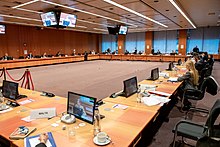Political and Security Committee
| This article is part ofa serieson |
 |
|---|
|
|
ThePolitical and Security Committee(PSC;sometimes referred to by its FrenchCOPSacronym derived fromComité politique et de sécurité) is a permanent body within theEuropean Uniondealing withCommon Foreign and Security Policyissues, includingCommon Security and Defence Policy.[1]
PSC, which is based inBrussels,consists ofambassadorial-level representatives from all the EU Member States and usually meets twice per week.[2]The PSC is chaired by theEuropean External Action Service(EEAS).
Functions
[edit]The main functions of the PSC are keeping track of the international situation, and helping to define EU policies within the CFSP and CSDP.[3]PSC sends guidance to, and receives advice from theEuropean Union Military Committee(EUMC), theCommittee for Civilian Aspects of Crisis Management(CIVCOM) as well as theEuropean Union Institute for Security Studies.It is also a forum for dialogue on CSDP matters between the EU Member States.
The PSC drafts opinions for theForeign Affairs Council,which is one of the configurations of theCouncil of the European Union.CFSP matters are passed to the Foreign Affairs Council viaCOREPERII.
Role in command and control of missions
[edit]TheEU command and control (C2) structureis directed by political bodies composed ofmember states' representatives, and generally requires unanimous decisions. As of April 2019:[4]
- Liaison:Advice and recommendationsSupport and monitoringPreparatory work
| Political strategic level:[5] | |||||||||||||||||||||||||||||||||
| ISS | EUCO Pres.(EUCO) | Chain of command | |||||||||||||||||||||||||||||||
| Coordination/support | |||||||||||||||||||||||||||||||||
| SatCen | CIVCOM | HR/VP(FAC) | |||||||||||||||||||||||||||||||
| INTCEN | HR/VP(PMG) | HR/VP(PSC)[6] | CEUMC(EUMC) | ||||||||||||||||||||||||||||||
| CMPD | DGEUMS[3](EUMS) | ||||||||||||||||||||||||||||||||
| Military/civilian strategic level: | |||||||||||||||||||||||||||||||||
Dir MPCC[3](MPCC) | JSCC | Civ OpCdrCPCC[1] | |||||||||||||||||||||||||||||||
| Operational level: | |||||||||||||||||||||||||||||||||
| MFCdr[4](MFHQ) | HoM[1] | ||||||||||||||||||||||||||||||||
| Tactical level: | |||||||||||||||||||||||||||||||||
| CC[2]Land | CC[2]Air | CC[2]Mar | Other CCs[2] | ||||||||||||||||||||||||||||||
| Forces | Forces | Forces | Forces | ||||||||||||||||||||||||||||||
- 1In the event of a CSDP Civilian Mission also being in the field, the relations with theCivilian Planning and Conduct Capability(CPCC) and its Civilian Operation Commander (Civ OpCdr), as well as the subordinate Head of Mission (HoM), are coordinated as shown.
- 2Other Component Commanders (CCs) andservice brancheswhich may be established.
- 3The MPCC is part of the EUMS and Dir MPCC is double-hatted as DGEUMS. Unless the MPCC is used as Operation Headquarters (OHQ), either a national OHQ offered by member states or theNATOCommand Structure (NCS) would serve this purpose. In the latter instance,Deputy Supreme Allied Commander Europe(DSACEUR), rather than Dir MPCC, would serve as Operation Commander (OpCdr).
- 4Unless the MPCC is used as Operation Headquarters (OHQ), the MFCdr would be known as a Force Commander (FCdr), and direct a Force Headquarters (FHQ) rather than a MFHQ. Whereas the MFHQ would act both on the operational and tactical level, the FHQ would act purely on the operational level.
- 5The political strategic level is not part of the C2 structure per se, but represents the political bodies, with associated support facilities, that determine the missions' general direction. TheCouncildetermines the role of theHigh Representative(HR/VP), who serves asVice-Presidentof theEuropean Commission,attendsEuropean Councilmeetings, chairs theForeign Affairs Council(FAC) and may chair thePolitical and Security Committee(PSC) in times of crisis. The HR/VP proposes and implements CSDP decisions.
- 6Same composition asCommittee of Permanent Representatives(COREPER) II, which also prepares for the CSDP-related work of the FAC.
History
[edit]
The creation of the PSC was a result of theTreaty of Amsterdam,after which the establishment of the PSC was agreed in principle in December 1999, at theHelsinkiEuropean Council. PSC was first established as an interim body in 2000. In December 2000, at theNiceEuropean Councilit was agreed to make it permanent.[1]The formal decision to set up the PSC was taken on January 22, 2001, by theCouncil of the European Union.[5]
The PSC replaced the previous Political Committee, which met less frequently, and consisted of representatives from the Member States' capitals rather than Brussels-based ambassadors.[2]
Chair
[edit]In 2010 AmbassadorOlof Skoog(Sweden) was appointed by the EU High Representative Catherine Ashton to serve as the first Permanent Chair of the EU Political and Security Committee. He served until September 2013 when he was replaced by Walter Stevens (Belgium).
See also
[edit]- Common Security and Defence Policy
- European External Action Service
- Military of the European Union
- European Union Military Committee
- European Union Military Staff
References
[edit]- ^abEuropa glossary: Political and Security Committee (PSC)Archived2008-03-09 at theWayback Machine,accessed on April 21, 2008
- ^abFrance-Diplomatie: The main bodies specific to the CFSP: The Political and Security Committee,accessed on April 21, 2008
- ^The Council of the European Union: ESDP Structures,accessed on April 21, 2008
- ^EU Command and Control,p. 13,Military Staff
- ^Activities of the European Union: Summaries of Legislation: Political and Security Committee (PSC),accessed on April 21, 2008




